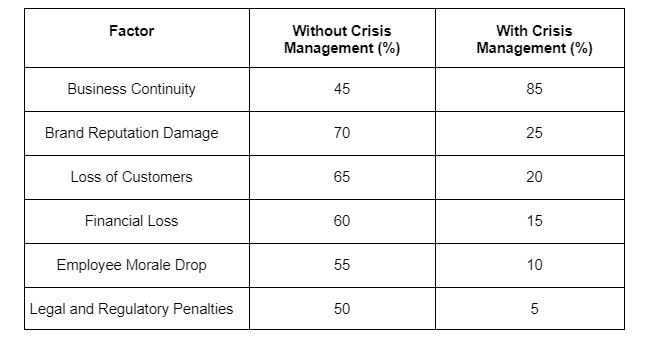
Organizations deal with a variety of crises in today's fast-paced, globally linked world, which may have a big influence on their operations, reputation, and overall performance. It is essential to have a clear crisis management strategy in place in order to react to and recover from unforeseen situations.
Your odds of surviving public relations nightmares might be raised by organizing your crisis communication in advance. Being proactive in preparing your staff and leadershipfor a downturn may boost confidence and reduce fear. Whether your crisis is caused by natural, financial, personnel, organizational, or technological issues, we have provided the top strategies and tactics for recovering from a crisis.
What Is Crisis Management?
The process of handling an unfavorable circumstance that might significantly harm a business's development, revenue, and reputation is known as crisis management. Anything from a terrorist attack to a natural disaster to a product recall might cause a crisis. Reacting swiftly and skillfully to minimize harm and set up your business for recovery when the present crisis has passed is the aim of crisis management.
A proactive crisis strategy works. It seeks to foresee future issues, such as natural catastrophes or worries about product safety, in order to lessen the likelihood that a crisis would arise in the first place. It also establishes protocols for what to do in the event that something goes wrong.
Every second counts during a crisis, so it's critical to know exactly what you're going to say and do. Regardless of the nature or scope of the crisis, crisis management is essential for well-known companies whose reputations might suffer grave harm.
What Are The Steps For Effective Crisis Management And Recovery?
Start by developing a crisis and recovery plan that works. A crisis management plan, or CMP, is a reference guide that includes forms to be used in documenting the crisis response, reminders of standard actions to take in a crisis, and lists of important contacts.
Ensure Your Company Has A Plan
By pre-assigning duties, designating certain persons within the firm for suitable call-to-actions, gathering information ahead of time, and acting as a point of reference, a Crisis Management Professional (CMP) can save time during a crisis.
Don't forget to utilize, maintain, and update the CMP after it has been created. A CMP is often created by corporations, lost, and forgotten, buried in a drive folder, for example.
Get Your Legal Team Involved
Talk about the CMP with your legal team, and make sure that any external copy complies with legal and commercial requirements and is authorized. Your legal team can join the group of professionals who can aid in recovery if they are aware of your crisis management plan.
Consider Departments That May Be Affected
When a crisis arises, take into account everyone involved:
- Internal - employees, stakeholders, patients, partners,
- External - community, customers, generic public, potential candidates.
Effective communication is necessary to let people know what actions you are taking to help them and to provide them with any answers they may require, both internally and outside. For example, during a crisis, workers may worry about being laid off. How can you address these concerns while ensuring that your financial, legal, and HR departments are all on the same page?
Determine Which Departments To Include
Go over the significance of participation for each department, including hiring managers, legal, digital and social media, public relations, and marketing & communications. This is only a short list of those who are often affected firsthand following a disaster. The more advanced training they have, the more issues they can solve as a team.
Have A Trained Crisis Management Team
Pre-assigned duties assume that a crisis team has been appointed. In a crisis, the team member or members should be aware of their duties and obligations. By adhering to the Crisis Management Procedure (CMP), they will get a list of contact details for the appropriate person or people, material that has been pre-drafted and authorized for use on social media and news sources, and advice on what to say and what not to say during a crisis.
Please be aware that depending on the nature of the situation, the composition may change. For example, you should promptly notify your followers and users of a compromised website and security breach by adopting a call to action that is relevant, urgent, and instructive. You may reduce anxiety and demonstrate the actions you are taking to get over this problem by communicating on time.
Prepare For Physical And On-Site Needs
Considering your potential resources in an emergency is essential while handling crisis management. Recognize that crises may take many various forms (e.g., a security breach, a lockdown on the entire firm, a viral tweet, etc.). Your business should anticipate both online and offline scenarios.
As a result, make sure you have the material resources required to support your employees and guarantee their safety, safeguard the assets of your organization, or aid in business continuity and recovery.
Conduct A Crisis Management And Recovery Exercise At Least Annually
Change your CMP at least once a year. Why would you want to know? In a year, or even in a few seconds, a lot may happen. A bad social media post has the potential to become viral quickly, so it's critical to put this crisis management plan into action while constantly refining it in light of new circumstances.
In a crisis, your ability to function at your peak efficiency depends on your level of preparation. It would help if you carried out the exercise every year to see whether the CMP and your team are prepared for a catastrophe. Provide an online program that all staff members must study and complete, along with an evaluation that they must pass.
Provide your staff with a variety of crisis management scenarios to ensure that they are equipped to handle any situation that may come up. A knowledgeable team is a productive team. Rather than responding to the problem as it arises in real time, it is more proactive to have a plan and practice.
What To Include In A Crisis Management Plan?
A well-structured crisis management plan is essential for any organization to navigate unexpected disruptions and mitigate their impact effectively. Here are some key elements that should be included in such a plan:
- Clear objectives - Define the primary goals of your crisis management plan, whether it's to protect lives, preserve reputation, minimize financial losses, or all of the above.
- Risk assessment - Identify potential crisis scenarios relevant to your industry and organization, evaluating their likelihood and potential impact.
- Chain of command - Establish a clear hierarchy of responsibility, designating who will lead crisis response teams and decision-making processes.
- Communication protocols - Outline how internal and external communication will be managed during a crisis, including spokespeople, message consistency, and media relations.
- Stakeholder identification - Identify key stakeholders and develop strategies for engaging with them, ensuring their needs and concerns are addressed.
- Training and drills- Regularly train employees on crisis response procedures and conduct mock drills to test the plan's effectiveness.
- Resource allocation - Determine the necessary resources, both human and material, that will be required during a crisis.
- Recovery and continuity plans- Develop strategies for getting the organization back to normal operations and ensuring business continuity.
- Documentation and record-keeping- Maintain thorough records of the crisis event, response actions, and outcomes for future analysis and improvement.
- Review and revision- Periodically assess and update the crisis management plan to adapt to evolving risks and lessons learned from past incidents.
How Do Crises Affect Businesses?
- About 25%of businesses need a plan to keep operating during a crisis.
- After a disaster, 40-60% of small businesses never open again.
- Businesses lose an average of $100,000 for every hour they can't work during a crisis.
- More than half of businesses see their reputation and customer trust drop after a crisis.
- The typical cost of a data breach for a company is $3.86 million.
- Employee productivity goes down by 20% during a crisis.
- Costs related to a crisis can make a company spend up to 20% more on their operations.
- Companies can lose up to a quarter of their employees during and after a crisis.
- Publicly traded companies can see their stock value decrease by 7% after a crisis.
- On average, it takes businesses about 18 months to fully recover from a crisis.
- If a crisis isn't handled well, companies could lose up to 30% of their customers.
- The usual insurance claim for a business interruption is $1.36 million.
- After a crisis, businesses might have to pay 20% more for their insurance.
- Investing in crisis management and being prepared can reduce the impact of a crisis by up to 90%.
Practical Strategies For Crisis Communication
Prepare A Crisis Communication Plan
Even though crises frequently strike without warning, you may be ready by assembling a crisis management team and developing a communication plan. In general, the following details have to be included in the plan:
- Goals
- Members of your crisis management team
- Who your target audiences are
- Numbered steps to take when a crisis emerges
- How to communicate with the public, such as on your social media channels and in your published content or official statements
- How to prevent the issues from happening or (in the case of natural crises) at least from hurting your company
You may create a custom crisis communication strategy for your company or use templates that you can obtain from the internet. You must tailor your strategy to the specific demands and type of crisis faced by your firm, even if you choose to utilize an example template.
Put The Customer First
A crisis typically elicits intensely unpleasant feelings. If your business makes mistakes, dissatisfied clients could post critical reviews on social media or review websites like Yelp and Google.
When this occurs, avoid assigning blame. Instead of creating a defensive communication environment on your social media, including your corporate blog, try to cultivate an attitude of support and collaboration.
Communicate With The Public Quickly And Accurately
During a crisis, inaccurate information can worsen the situation and incite fear among your target audience. Make sure that the data and supplementary resources you publish on your website and social media accounts or send to media outlets as public statements are accurate.
Regularly provide updates to minimize doubt, fear, and gossip. Choose a single spokesperson to represent your business, if at all possible. All of the content you provide across various platforms, including social media, the corporate website, and the media at large, needs to be truthful, transparent, and open.
Take Advantage Of All Communication Channels
Engage your audience through a variety of channels, including social media, your website, voicemail, text messaging, email, and a toll-free customer care hotline.
Publish updates through conventional means in addition to internet ones. For example, if you need to close or alter your hours, edit your voicemail message and post a notice on the store's door.
Some businesses continue to run on an alternative business model, such as offering online goods sales or telemedicine for doctor appointments. Inform your clients of any modifications or additions to your service.
Even when your business or office is closed, you still need to check your voicemail and answer calls from clients. For instance, a client could have placed an order with you before the emergency, but they are unable to pick it up since your business is closed. They could contact you by phone, email, or text in this situation, so be sure to monitor all of these avenues and reply to them.
Use Social Media As A Crisis Communication Tool
Social mediais a popular instrument for communicating during a crisis. For instance, a lot of businesses utilize Twitter to reach out to their clientele in times of need. You may use Twitter to share corporate announcements and updates as frequently as needed. Both you and other Twitter users can receive retweets and replies from your audience.
You may utilize your corporate blog as a crisis communication tool in addition to social media platforms like YouTube, LinkedIn, Facebook, Instagram, Pinterest, Snapchat, TikTok, and Facebook.
Although using social media as a tool for crisis communication is becoming standard practice for businesses, every crisis is unique. To select the best channels and messages for communication, take the circumstances and crisis into consideration.
What Are The 7 Rs For Recovering From A Crisis?
The 7 Rs for Recovering From A Crisis are a set of strategic tactics that organizations often employ to navigate and rebound from challenging situations effectively:
- Renounce - Acknowledge and take responsibility for any mistakes or wrongdoings that contributed to the crisis. Admitting fault is the first step towards rebuilding trust.
- Reinvent - Innovate and adapt by reevaluating business processes, products, or services. Identify areas for improvement and make necessary changes to become more resilient.
- Restructure- Review your organization's structure and operations. Streamline processes, cut unnecessary costs, and reallocate resources to ensure efficiency and sustainability.
- Rebuild - Focus on rebuilding what was damaged or lost during the crisis, whether it's physical assets, customer relationships, or employee morale. Prioritize restoration efforts.
- Rename - In some cases, rebranding or renaming can help distance the organization from the crisis's negative associations. It can signal a fresh start and renewed commitment.
- Rebrand - If necessary, redefine your brand image and reputation. Communicate a new narrative that emphasizes positive attributes and values, aligning with your recovery goals.
- Reset- Use the crisis as an opportunity to reset your organization's priorities, values, and long-term goals. Reestablish your commitment to your mission and stakeholders.
What Are Some Common Mistakes To Avoid During A Crisis?
During a crisis, it is essential to avoid common mistakes that can worsen the situation, damage the image of the organization, and alienate stakeholders. Some of the common mistakes to avoid during a crisis, as highlighted in the search results, include:
- Delaying action or ignoring the problem - This can make the situation worse and lead to negative consequences. It is essential to respond quickly and with clear, factual information when a crisis strikes.
- Not communicating effectively - Poor communication can lead to confusion, misinformation, and rumors. It is essential to communicate quickly, clearly, and frequently with stakeholders, acknowledging the situation, expressing empathy, and sharing what is being done to address it.
- Blaming others or being defensive- This can damage the credibility and reputation of the organization. It is essential to take responsibility for the situation and avoid blaming others.
- Being unprepared - Lack of planning and preparation can lead to poor crisis management. It is vital to have a crisis management plan in place and to be proactive and active in communication.
- Not taking personal responsibility - It is essential for leaders to take personal responsibility for the crisis and to respond in a timely, transparent, and genuine manner.
- Ignoring the emotional toll of the crisis- Leaders must acknowledge the emotional toll a crisis can take on people and demonstrate empathy through communication. They must pay special attention to employees by communicating with them frequently and confidently.
Frequently Asked Questions
Is There A Role For External Experts In Crisis Recovery?
Yes, external experts, such as PR professionals or legal advisors, can provide valuable guidance in navigating complex aspects of recovery.
How Can Effective Communication Aid In Crisis Recovery?
Effective communication helps rebuild trust and transparency. Regular updates, acknowledging mistakes, and outlining corrective actions can reassure stakeholders and customers.
What Steps Can Be Taken To Rebuild Employee Trust And Morale?
Rebuilding trust and morale involves open communication, providing support, and recognizing employees' contributions during the recovery process.
How Can Businesses Assess The Financial Impact Of A Crisis Accurately?
Accurate assessment involves a thorough financial analysis, including evaluating losses, insurance coverage, and potential recovery costs.
Final Words
It is crucial to understand the strategies and tactics for recovering from a crisis. Crisis management is a vital aspect of modern business operations. Crises can have devastating effects on an organization's reputation, finances, and overall stability. A proactive approach to crisis management, including effective communication, preparation, and recovery strategies, is essential.
By addressing potential crises with a clear plan and assigning responsibilities, organizations can respond swiftly and decisively, minimizing damage and restoring normalcy more efficiently. Recognizing the diverse range of crises, from technological failures to natural disasters and personnel issues, enables better readiness. Regular training and drills are instrumental in ensuring a well-prepared crisis management team.
Ultimately, investing in crisis management not only reduces the impact of a crisis but also enhances a company's ability to adapt and thrive in the face of adversity, safeguarding its future success.






